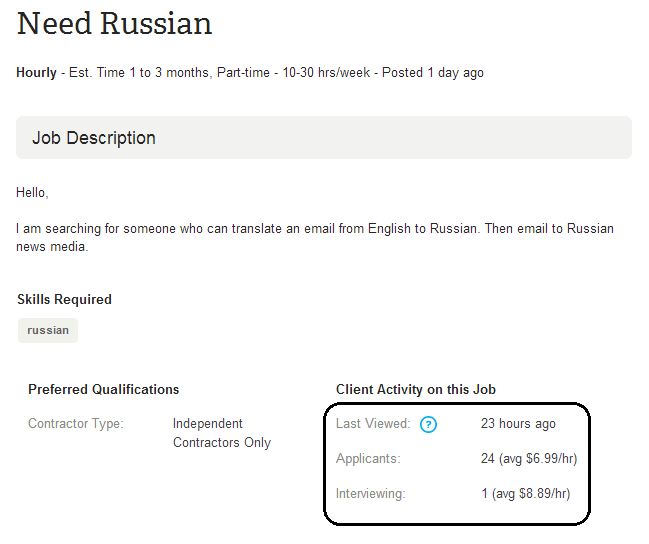 How a prospect treats me as early as the preliminary negotiations stage determines whether I’d work with them or not. Note this post is not about paying clients vs scammers. It’s more about the mentality of the ideal client and how they treat their freelancers compared to bad freelance clients.
How a prospect treats me as early as the preliminary negotiations stage determines whether I’d work with them or not. Note this post is not about paying clients vs scammers. It’s more about the mentality of the ideal client and how they treat their freelancers compared to bad freelance clients.
Ideal clients don’t need a freelancer to work for them. They need a freelancer to work with.
Remember the blog post about the difference between freelancers and employees? The same principles apply to freelance clients, too. The ideal client is not looking for someone to boss around. They hire professional service providers and need a partner for mutually beneficial working relationship. Bad freelance clients often don’t have this attitude when looking for workers.
The ideal client will never approach you thinking you owe them something.
I have met plenty of prospects who think I must work with them only because they have offered me a paid job. They don’t realize I am choosing my clients as much as they choose their freelancers. They think they are God by holding the money and they are allowed everything as long as they pay.
WRONG! Your ideal clients will never treat you like some hungry low-life person who will be ready to do anything and everything for a couple of bucks. They realize you have a certain set of skills they need and are ready to pay top dollar for it. They don’t tell you what to do – they ask you if you are interested to work with them. They don’t expect you to say ‘yes’ to everything only because they pay you.
Your ideal client respects and values your time.
I still get a lot of emails from prospects without any substantial info, asking me to call them to discuss their projects. These freelance clients fail to realize why I never go running to them.
The ideal client is the one, who diligently fills in all the fields in your contact form; the one who always gives enough info before asking you to meet them. Those clients don’t waste their time and treat their freelancers the same way. They keep their word, come to a meeting on time, answer questions when asked, and send feedback in a timely manner.
Ideal clients never enter a contract with a freelancer, ‘knowing’ they will be deceived.
Most bad clients have trust issues. They micro-manage you and straightforwardly think they can do your job better than you, no matter if they are experts in your field. They often think you don’t deserve the money they are paying you. As a result, they always think you will rob them in some way and lie to their face.
Your ideal client is just the opposite. He or she trusts you. They seek your help because of your skills and expertise. They know that taking on their project, you put your name and reputation on the line and there is absolutely no reason for you to deceive them. It is in both your interests if you did your job well.
Your ideal client respects your hard work.
They will never even think of paying you less than what you agreed on. They will never delay a payment, unless something unforeseen has happened. They don’t care how much time it took you to do your job. All they take interest in is you did it on time, with quality and within budget. In turns, they pay for a job well done on time and as much as you agreed on.
And finally, your ideal client doesn’t try to win you with empty promises and pretending to be your friend.
Personal questions may be fine between freelancers and clients who have worked together for months or years. A good prospect would never pretend to be your friend when they don’t know you at all. Starting preliminary negotiations with personal questions and presuming upon a short acquaintance is somewhat distasteful.
On-topic conversations discussing the details of the future collaboration is what your ideal client would do instead. They know the first impression is very important and they would never risk that by trying to win you with inappropriate questions.
A final word about ideal clients vs bad ones…
How your prospect treats you during the negotiations says a lot about their working style in general and what type of working relationship you would have with them. So freelancers, choose your clients carefully; clients, treat your freelancers wisely!
How much does your prospect attitude influence your decision to take them as a client?
And if you are a client, you may check out an old post with some tips how to be a better client with whom freelancers want to work.





Hi Diana. Love this article. Spot on. I have just had a rather difficult experience with a brand new client. Scanty and hopelessly understated information on the scope of job initially (and yes I did ask) leading me to believe it will only require a couple of interviews and minimal research. Deadline was ridiculously tight so I accepted it thinking that I could still pull it off if they are giving me some info to work with (which is what I thought). Turns out after the contract was signed, I had to do all the research and based on very poor briefs (all I was given were article headings – no angle, direction, key message to bring across, etc.) – and yes, again I did ask, only to receive not too much more info so I used my discretion in the end. But it was also a lesson learned – to be more demanding up front on getting sufficient information from the client to know whether a deadline is realistic and have sketchy briefs properly filled out before I tackle the job. This was a tough one – job got done in the end, but now I know better for next time. You live and learn!
Hi, Deevra – I believe we all get in this situation at some point. There is nothing wrong in being demanding upfront – actually, I believe that the more demanding you are, the more your clients will respect you, not to mention the easier it will be for you to do your job.
Congrats on pulling it off after all and yes, the important thing is you learned your lesson and will know better next time. 😀
Another great article, Diana. I agree with your comment about “trust” issues, as I have learned to recognize this tone in their initial proposals. While I am still (and probably always will be) a “hungry freelancer”, I have become much more discerning and selective in the contracts I accept. In my initial response to my clients, I always share with them a few details about my communication style. I write something to the effect: “I am a highly collaborative writer, and appreciate timely feedback to keep our project momentum flowing”.
I always look forward to your articles, Diana – thank you!
Belinda
Thanks for your kind words and positive feedback, Belinda! A curious fact I discovered – clients seem to respect more and be more inclined to work with freelancers who have their principles and stand by them. If you are more demanding, clients respect you more because they know you have been around long enough to have your own working style and preferences.
Wishing you many happy clients 😀
~Diana
This is such a great reminder to VET YOUR clients! I think it’s sage advice for almost any industry, with the possible exception of food service. After all, as a server, you can’t dictate who sits at your table, right? But the one thing that holds true is that you can pretty much tell from the initial negotiations what type of client you may be dealing with. Great article!
Thanks, Jacquie! You made me laugh with your comment because I started picturing a waiter who is spilling soup on their least favorite customer, hoping that they would never sit at a table he or she is attending to. So if you really really want, I suppose you could vet your clients even as a waiter LOL